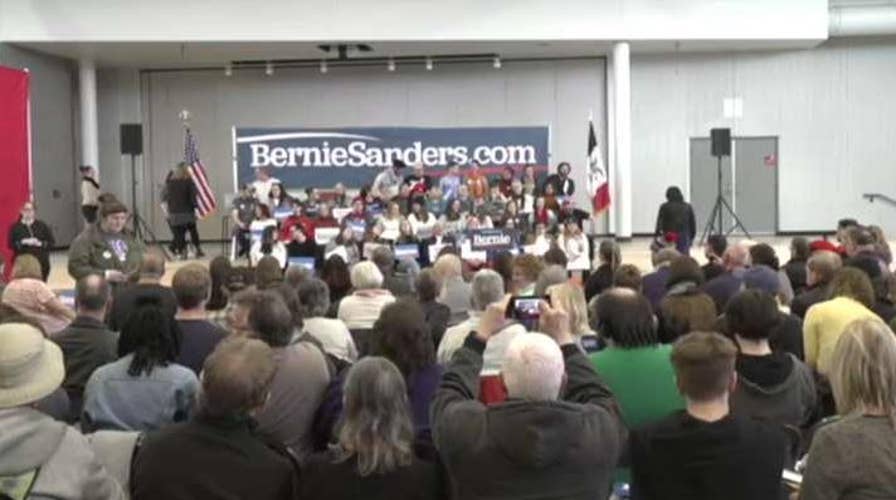Bernie Sanders top pick for Democratic nomination in latest Iowa poll ahead of February caucus
Democratic candidate Sen. Bernie Sanders campaigns in Iowa ahead of Caucus day; Associated Press national political reporter Alexandra Jaffe weighs in.
Tuesday night, the Democrats offer their last debate before the first contest of the campaign, the Iowa caucuses on Feb. 3.
The rules set by the party have winnowed the stage down to just six contenders. They include the top four who appear best positioned to win Iowa: Former Vice President Joe Biden, Former South Bend, Ind., Mayor Pete Buttigieg, and Sens. Bernie Sanders, I-Vt., and Elizabeth Warren, D-Mass., – as well as two remaining wildcards, Minnesota Sen. Amy Klobuchar, who has been the little engine who won’t give up, and businessman Tom Steyer, who has spent over $100 million on advertising, and whose surprising showing in several state polls led to his inclusion in the debate.
While most watching the debate will try to determine “who’s first,” I want to know “what’s on second?”
That’s because of the peculiar rules of the caucus system – combined with the sheer number of candidates – not just on the debate stage but especially those excluded from the debate, who are still campaigning in Iowa.
Under the rules, in any precinct, if candidates do not have enough support to elect a delegate (typically 15 percent of the caucus), then their supporters move to one of the leading candidates – and help them win delegates.
CLICK HERE TO SIGN UP FOR OUR OPINION NEWSLETTER
With so many candidates still running, plenty of supporters will walk into those caucuses in support of one and walk out having supported their second, or even third, choice.
More from Opinion
Indeed, in recent polls, over 30 percent of Iowa Democratic caucus-goers appear to support a candidate who is unlikely to be above the threshold for winning delegates. In other words, during the course of the evening, 30 percent of people – more than support any of the top four candidates – will wind up caucusing for their “second choice.”
And so for the leading candidates – the ones on the debate stage on Tuesday – the goal is not just to win the audience over, but to make sure voters find them an acceptable “second choice.”
On one level, that’s been Biden’s strategy from the beginning. Over 75, and having been a serious contender for the presidency for as long as Buttigieg has been alive (indeed, from the time he was Mayor Pete’s age), he knows people aren’t going to fall in love with him. But as long as he maintains viability, he knows that folks may eventually turn around and think, “OK, it’s Joe.” While he’s had more than his usual string of gaffes, he’s never really stumbled, yet.
Focusing on second has to be the strategy for the moderates on stage, including Buttigieg and Klobuchar, as well as the liberal stars, such as Sanders and Warren.
Of those, the one with the most to gain from the debate is certainly Amy Klobuchar. She knows her campaign rests entirely on the results of Iowa. While she has had some good moments in the campaign so far, she has never been able to connect and put herself in the top tier in either national or statewide polling.
In this debate, she represents the most experienced (two terms in the Senate) moderate alternative to Biden. But in the two most recent Iowa surveys, she polled at around 6 to 8 percent, suggesting some recent growth in her support. Moreover, support in the early contests can easily shift during the last days leading up to the actual event, and a strong showing in the debate – a momentary challenge against Biden, or against the more liberal candidates, Sanders and Warren – could give her that boost. But if she doesn’t do well Tuesday, and fails to have a strong showing in Iowa, it’s not clear how much further she will be able to sustain her campaign.
Buttigieg will likely try something similar. Both CNN and Monmouth polls suggest he’s fallen from the heights of Iowa’s "Pete boom" of a few weeks ago. But his youth and thin experience made that inevitable as voters contemplated a “President Pete.” A focus on being an acceptable second choice enables him to focus attention on his articulate intellect and away from his small city stature.
The two progressive candidates, Warren and Sanders, also need to focus on trying to be people’s second choice, but it’s a lot harder for them. While recent polls suggest Warren is many voters’ second choice, that’s mainly folks for whom Sanders is the number one choice. And in the Iowa caucuses, it means they’ll likely stick with Sanders.
The question for either is whether they can expand beyond that roughly 40 percent of the Democratic electorate that wants to nominate someone seeking to fundamentally change the system. They should seek to use the debate to appear more acceptable to the other 60 percent -- the ones who are solely focused on ensuring that Trump moves out of the White House.
CLICK HERE TO GET THE FOX NEWS APP
I suspect they won't. Instead, they'll likely intensify their rivalry in a way that makes Biden, Buttigieg, and Klobuchar think, “when my opponents are fighting each other, I should get out of the way and cheer them on."
The one with the most to lose Tuesday is likely Biden. But that’s been the reality of every debate to date. And if things continue that way, it won’t be surprising to find Iowa say, "OK, it’s Joe."









































